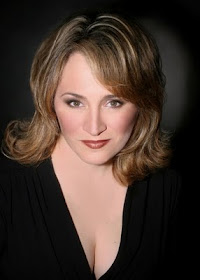 The Vocal Arts Society presented soprano Patricia Racette on Friday night at the Austrian Embassy, in a recital combining art songs and cabaret songs. Few who experienced Racette in the roles of Ellen Orford and especially Jenůfa at Washington National Opera, or as Leslie Crosbie at Santa Fe Opera, were left with any doubts about her startling ability to incarnate a character’s anguish with her voice. She can deploy her complex tone, thick with vibrato and other colors like the tannins in a potent red wine, to pack an emotional punch that can knock out the listener with its urgency. It was clear from her stage presence that she understood and has considered the words of the songs she sang, but she always stopped short of grossly emoting, making for a deeply satisfying performance. This was all the more remarkable in that Racette coughed and drank water throughout the performance: one suspects that the record pollen counts in the local air this week have played havoc with her voice.
The Vocal Arts Society presented soprano Patricia Racette on Friday night at the Austrian Embassy, in a recital combining art songs and cabaret songs. Few who experienced Racette in the roles of Ellen Orford and especially Jenůfa at Washington National Opera, or as Leslie Crosbie at Santa Fe Opera, were left with any doubts about her startling ability to incarnate a character’s anguish with her voice. She can deploy her complex tone, thick with vibrato and other colors like the tannins in a potent red wine, to pack an emotional punch that can knock out the listener with its urgency. It was clear from her stage presence that she understood and has considered the words of the songs she sang, but she always stopped short of grossly emoting, making for a deeply satisfying performance. This was all the more remarkable in that Racette coughed and drank water throughout the performance: one suspects that the record pollen counts in the local air this week have played havoc with her voice.The high point of the program was a set of Poulenc mélodies, refined songs to exquisite poetry by Jean Anouilh, Max Jacob, Colette, and Guillaume Apollinaire, to name a few. Poulenc’s music remains one of the best examples of how successfully to integrate popular idioms into classical music: by fusing them into his personal harmonic and melodic language to make a hybrid greater than the popular source, rather than merely a pale shadow of it. Racette used a broad palette of vocal colors and gestures to incarnate the various characters of the poetry -- semi-bitter recollection (Les chemins de l'amour), a skittish maidservant prattling in an anxious prayer (La petite servante) followed by a serene entreaty to the Virgin Mary (Priez pour paix), and so on. Here especially her associate artist, Craig Terry, showed an always sensitive hand at the keyboard -- capable of taming Poulenc's large-handed piano parts with ease but also finding the right color and dynamic with a finely tuned touch to put his singer at her ease.
Racette called a set of songs by Italian opera composers her "spaghetti and meatballs section," and indeed by comparison to the refined flavors of the Poulenc set this was bistrot fare, solid, tasty, and above all cheap. These songs showed off the pointed, affecting top of Racette's voice, a sound that can pull at the heartstrings very effectively. As songs, they were at best harmless if not profound, and at worst dangerously near-banal: for example, rather than trying to make something significant out of the meager introduction to Puccini's Menti' a l'avviso, Terry could just as well have omitted it. The performance of a scena ("To this we've come... Papers, papers") from Menotti's The Consul, an opera Racette admitted to having "fallen in love with," made one hope that a savvy company somewhere -- hello, Washington National Opera? -- is planning a production of this opera for Racette to sing the role of Magda Sorel. Racette was filled with such angst and frustration, after having pointed out in her introduction to the piece the irony of performing a scene set in a consulate in the Austrian Embassy.
Joe Banno, Patricia Racette at the Austrian Embassy (Washington Post, April 12) |
The next recital in the Vocal Arts Society's season will feature baritone Christopher Maltman (April 27, 7:30 pm), at the Austrian Embassy (note the new VAS Web site), while the American Music Festival continues through May 30. As for Patricia Racette, she is headed to New York, to replace Karita Mattila in the title role of Puccini's Tosca at the Met.
No comments:
Post a Comment